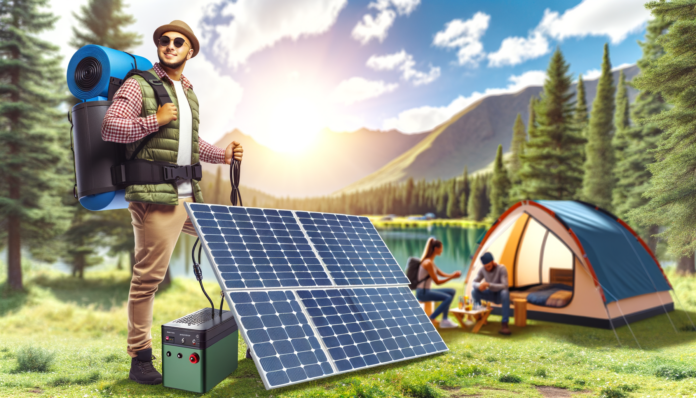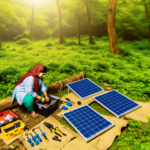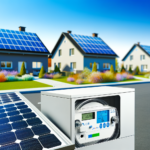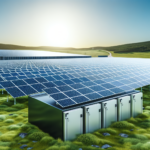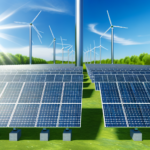Introduction
The Growing Popularity of Solar Energy Among Outdoor Enthusiasts
In today’s fast-paced world, the allure of the great outdoors has never been stronger. Whether it’s camping, hiking, boating, or living off-grid, outdoor enthusiasts are increasingly seeking ways to stay connected and powered up while enjoying nature. One of the most significant trends in this space is the adoption of solar energy. Portable solar panels and solar-powered gadgets have become essential gear for many adventurers, offering a sustainable and convenient way to harness the sun’s energy.
The rise in popularity of solar energy among outdoor enthusiasts can be attributed to several factors. First, the advancements in solar technology have made solar panels more efficient, compact, and affordable. Second, the growing awareness of environmental issues has led many to seek eco-friendly alternatives to traditional fossil fuels. Lastly, the convenience of having a reliable power source in remote locations cannot be overstated. Solar energy allows outdoor enthusiasts to charge their devices, power their campsites, and even run small appliances without relying on noisy generators or disposable batteries.
Why Reliable Energy Storage is Crucial
While solar panels are excellent for capturing energy from the sun, they are only part of the equation. The real game-changer lies in how this energy is stored and utilized. Reliable energy storage solutions are crucial for several reasons:
- Consistency: The sun doesn’t shine 24/7. Reliable energy storage ensures that the energy captured during the day can be used at night or during cloudy weather.
- Portability: Outdoor activities often take place in remote locations where traditional power sources are unavailable. Portable energy storage solutions allow adventurers to carry their power supply with them.
- Emergency Preparedness: In emergency situations, having a reliable energy storage solution can be a lifesaver. It ensures that essential devices like GPS units, communication tools, and medical equipment remain operational.
- Environmental Impact: Efficient energy storage reduces the need for disposable batteries and fossil fuel generators, contributing to a lower carbon footprint.
Purpose and Scope of the Article
The purpose of this article is to explore the next-generation solar energy storage solutions that are revolutionizing the way outdoor enthusiasts power their adventures. We will delve into the basic principles of solar energy and how it is stored, examine the latest advancements in solar energy storage technologies, and discuss the myriad benefits these solutions offer. Additionally, we will provide practical applications and use cases, helping readers understand how to choose the right solar energy storage solution for their needs.
By the end of this article, readers will have a comprehensive understanding of the importance of reliable solar energy storage, the cutting-edge technologies available, and how to integrate these solutions into their outdoor activities. Whether you’re a seasoned adventurer or a weekend warrior, this guide will equip you with the knowledge to make informed decisions and embrace the power of the sun for a more sustainable and enjoyable outdoor experience.
Understanding Solar Energy Storage
Basic Principles of Solar Energy
Solar energy harnesses the power of the sun to generate electricity. This is primarily achieved through photovoltaic (PV) panels, which convert sunlight directly into electrical energy. The process involves the absorption of photons by semiconductor materials in the PV cells, which then release electrons, creating an electric current. This clean and renewable energy source is increasingly popular among outdoor enthusiasts due to its sustainability and the ability to generate power in remote locations.
How Solar Energy Storage Works
While solar panels generate electricity during daylight hours, energy demand often peaks in the evening or during cloudy periods when solar production is low. This is where solar energy storage comes into play. Energy storage systems capture the excess electricity produced by solar panels and store it for later use. This stored energy can then be used when solar generation is insufficient, ensuring a continuous power supply.
Energy storage systems typically use batteries to store electricity. When solar panels produce more electricity than is immediately needed, the excess energy charges the batteries. When the demand for electricity exceeds the solar production, the stored energy is discharged from the batteries to meet the demand. This process helps balance the supply and demand of electricity, providing reliability and resilience to solar energy systems.
Types of Solar Energy Storage Solutions
There are several types of solar energy storage solutions, each with its own advantages and applications:
- Electrochemical Storage (Batteries): The most common form of energy storage, batteries store and discharge electricity through chemical reactions. Lithium-ion batteries are the most prevalent due to their high energy density, long cycle life, and decreasing costs. Other battery types include lead-acid, sodium-ion, and nickel-based batteries.
- Thermal Energy Storage: This method stores energy in the form of heat, using materials like water or molten salt. The stored thermal energy can be used directly for heating or converted back into electricity. Thermal storage is particularly useful in Concentrated Solar Power (CSP) systems, where sunlight is focused to generate heat.
- Pumped-Storage Hydropower: This technology uses excess electricity to pump water uphill into a reservoir. When electricity is needed, the water is released to flow downhill, turning turbines to generate power. While effective, this method requires specific geographical conditions and significant infrastructure.
- Flywheel Storage: Flywheels store energy by spinning a rotor at high speeds. The kinetic energy is converted back into electricity when needed. Flywheels can quickly provide power but are limited in their energy storage capacity.
- Compressed Air Energy Storage (CAES): This system stores energy by compressing air into large vessels or natural formations. The compressed air is released to drive turbines and generate electricity. CAES systems are often integrated with natural gas power cycles to enhance efficiency.
- Solar Fuels: Solar energy can be used to produce fuels like hydrogen or methane, which can be stored and later combusted to generate electricity. This method effectively stores solar energy in chemical bonds.
- Virtual Storage: This concept involves adjusting the usage patterns of existing devices to store energy indirectly. For example, pre-cooling or pre-heating buildings before peak demand periods can reduce the need for electricity during those times.
Understanding these principles and types of solar energy storage solutions is crucial for outdoor enthusiasts looking to maintain a reliable and sustainable power supply during their adventures.
Next-Gen Solar Energy Storage Technologies
Advancements in Battery Technology
The backbone of any solar energy storage solution is its battery technology. Recent advancements have significantly improved the efficiency, lifespan, and safety of batteries used in solar energy storage. Lithium Iron Phosphate (LiFePO4) batteries, for instance, have become a popular choice due to their high energy density, long cycle life, and enhanced safety features. The Power-2Go EnergyStore 4000 exemplifies this with its LiFePO4 battery, offering up to 4,000 life cycles and a robust capacity of 5,120Wh. Additionally, innovations like EcoFlow’s X-Core 3.0 technology have set new benchmarks in fast and safe charging, enabling a full 1kWh charge in just 56 minutes while maintaining optimal battery health.
Integration with Smart Devices
The integration of solar energy storage systems with smart devices has revolutionized how users interact with and manage their energy consumption. Modern systems come equipped with Wi-Fi and Bluetooth capabilities, allowing for remote monitoring and control via smartphone apps. For example, the Power-2Go EnergyStore 4000 offers Wi-Fi-enabled remote monitoring, providing real-time system updates and software upgrades. This level of connectivity ensures that users can optimize their energy usage, receive alerts for maintenance, and even control their systems from anywhere in the world.
Portable and Lightweight Solutions
Portability and ease of transport are crucial for outdoor enthusiasts who require reliable power on the go. Next-gen solar energy storage solutions are designed to be both portable and lightweight without compromising on performance. The Power-2Go EnergyStore 4000, for instance, features rugged wheels and a telescopic handle, making it easy to move between indoor and outdoor spaces. Similarly, EcoFlow’s RIVER 3 Series offers compact sizes and pro-grade performance, making them ideal for camping, hiking, and other outdoor activities. These portable solutions ensure that users have access to reliable power wherever their adventures take them.
Durability and Weather Resistance
Outdoor environments can be harsh, and solar energy storage solutions must be built to withstand these conditions. Durability and weather resistance are therefore critical features. The Power-2Go EnergyStore 4000 boasts an IP54 water and dust resistance rating, ensuring reliable performance in diverse environments. Additionally, systems like the Anker SOLIX Solar & Storage Solution are designed to operate efficiently in extreme temperatures, from -20°C to 55°C, making them suitable for both hot summers and cold winters. These robust designs ensure that the systems can endure the rigors of outdoor use, providing uninterrupted power regardless of the weather conditions.
In summary, next-gen solar energy storage technologies are making significant strides in battery efficiency, smart device integration, portability, and durability. These advancements are not only enhancing the user experience but also making solar energy a more viable and reliable option for outdoor enthusiasts.
Benefits of Solar Energy Storage for Outdoor Enthusiasts
Sustainability and Environmental Impact
For outdoor enthusiasts, the allure of nature is often coupled with a commitment to preserving it. Solar energy storage solutions offer a sustainable way to power your adventures without leaving a carbon footprint. By harnessing the sun’s energy, you reduce reliance on fossil fuels, thereby decreasing greenhouse gas emissions. This eco-friendly approach not only helps in conserving the environment but also promotes a culture of sustainability among outdoor communities. **Embracing solar energy is a step towards a greener planet, ensuring that the natural beauty you enjoy today will be preserved for future generations.**
Independence and Self-Sufficiency
One of the most compelling benefits of solar energy storage for outdoor enthusiasts is the independence it provides. Whether you’re camping in a remote location or sailing on open waters, having a reliable source of power means you are not tethered to traditional energy grids. **Solar energy storage systems allow you to generate and store your own power, giving you the freedom to explore off-the-beaten-path destinations without worrying about running out of energy.** This self-sufficiency is particularly valuable in emergency situations, where access to conventional power sources may be limited or non-existent.
Cost-Effectiveness Over Time
While the initial investment in solar energy storage solutions can be significant, the long-term financial benefits are substantial. **Solar panels and storage systems have minimal maintenance costs and can last for decades, providing free energy once the initial costs are recouped.** Over time, this translates to significant savings, especially for those who frequently engage in outdoor activities. Additionally, the cost of solar technology continues to decrease, making it an increasingly affordable option for a wider range of users. By investing in solar energy storage, you not only save money but also protect yourself from the volatility of traditional energy prices.
Enhanced Safety and Reliability
Safety is a paramount concern for outdoor enthusiasts, and solar energy storage solutions offer a reliable and safe source of power. **Modern solar storage systems are designed to withstand harsh environmental conditions, including extreme temperatures, moisture, and physical impacts.** This durability ensures that your power supply remains uninterrupted, even in challenging situations. Moreover, solar energy storage systems eliminate the risks associated with fuel-based generators, such as fire hazards and carbon monoxide poisoning. With features like pure sine wave power output and robust protection mechanisms, these systems provide a stable and safe energy source, enhancing your overall outdoor experience.
In summary, solar energy storage solutions offer a multitude of benefits for outdoor enthusiasts, from promoting environmental sustainability to providing reliable and cost-effective power. By embracing these technologies, you can enjoy your adventures with the peace of mind that comes from knowing you are making a positive impact on the planet while ensuring your own energy independence and safety.
Practical Applications and Use Cases
Camping and Hiking
For outdoor enthusiasts, camping and hiking are quintessential activities that often require reliable power sources for various needs, such as lighting, cooking, and charging electronic devices. **Next-gen solar energy storage solutions** offer a sustainable and efficient way to meet these energy demands. Portable solar panels paired with advanced battery storage systems can capture and store energy during the day, providing a steady power supply throughout the night. These systems are lightweight and easy to carry, making them ideal for backpackers and campers who need to minimize their load. Additionally, many modern solar storage solutions are designed to be rugged and weather-resistant, ensuring they can withstand the harsh conditions often encountered in the wilderness.
Boating and Marine Activities
Boating and marine activities present unique challenges when it comes to energy storage. Traditional fuel sources can be cumbersome and environmentally damaging. **Solar energy storage systems** offer a cleaner, more efficient alternative. Solar panels can be installed on the deck of a boat to harness sunlight, which is then stored in high-capacity batteries. This stored energy can power essential equipment such as navigation systems, lights, and even small appliances. The integration of solar energy storage not only reduces the reliance on fossil fuels but also enhances the overall boating experience by providing a quiet and pollution-free environment. Moreover, these systems are designed to be highly durable and resistant to saltwater corrosion, making them perfect for marine use.
Living Off-Grid
For those who choose to live off-grid, having a reliable and sustainable energy source is crucial. **Solar energy storage solutions** provide an excellent way to achieve energy independence. By installing solar panels and advanced battery systems, off-grid dwellers can generate and store enough energy to power their homes, reducing or eliminating the need for traditional power sources. These systems can be scaled to meet various energy needs, from small cabins to larger homes. The ability to store excess energy generated during sunny days ensures a continuous power supply even during cloudy periods or at night. This not only promotes self-sufficiency but also significantly reduces the environmental impact of off-grid living.
Emergency Preparedness
In emergency situations, having a reliable power source can be a matter of life and death. **Solar energy storage systems** offer a dependable solution for emergency preparedness. Portable solar generators can be used to power essential devices such as medical equipment, communication devices, and lights during power outages. These systems are easy to deploy and can be quickly set up to provide immediate power. The ability to store solar energy ensures that there is a backup power supply available when the grid goes down. Additionally, solar energy storage systems are silent and produce no emissions, making them ideal for use in emergency shelters and other confined spaces.
In conclusion, next-gen solar energy storage solutions offer versatile and reliable power options for a variety of outdoor activities and emergency situations. Whether you’re camping in the wilderness, sailing the seas, living off-grid, or preparing for emergencies, these advanced systems provide a sustainable and efficient way to meet your energy needs.
Choosing the Right Solar Energy Storage Solution
Assessing Your Energy Needs
Before diving into the myriad of solar energy storage solutions available, it’s crucial to assess your specific energy needs. Start by considering the types of activities you engage in and the devices you need to power. For instance, a weekend camper might only need to charge a few small devices, while someone living off-grid will require a more robust system to power appliances, lighting, and possibly even heating or cooling systems. Make a list of all the devices you plan to use and their power requirements. This will help you determine the capacity and type of storage solution that best fits your needs.
Evaluating Product Features
Once you have a clear understanding of your energy needs, the next step is to evaluate the features of various solar energy storage products. Key features to consider include:
- Capacity: Ensure the storage solution can handle your energy requirements. Look for products with high capacity if you have significant energy needs.
- Charging Speed: Some products, like the Generac PWRcell, offer extremely fast charging times, which can be a significant advantage.
- Portability: If you need a solution for activities like hiking or camping, opt for lightweight and portable options.
- Durability: Consider the environmental conditions you’ll be facing. Products with high durability and weather resistance, such as those with NEMA 4X ratings, are ideal for harsh environments.
- Compatibility: Ensure the storage solution is compatible with your existing solar panels and other devices.
Reading Reviews and Seeking Recommendations
User reviews and expert recommendations can provide valuable insights into the performance and reliability of different solar energy storage solutions. Look for reviews from users who have similar needs and use cases as yours. Pay attention to both positive and negative feedback to get a balanced view. Additionally, seek recommendations from trusted sources such as renewable energy forums, outdoor enthusiast communities, and professional reviews. Brands like Anker SOLIX, which incorporate extensive user feedback into their product designs, often receive high marks for addressing real-world challenges.
Budget Considerations
Finally, consider your budget when choosing a solar energy storage solution. While it’s tempting to go for the most advanced and feature-rich option, it’s essential to balance cost with your actual needs. Here are some tips to help you make a cost-effective choice:
- Initial Cost vs. Long-Term Savings: Higher initial costs can be justified if the product offers long-term savings through durability, efficiency, and reduced maintenance.
- Incentives and Rebates: Check for any available incentives or rebates that can offset the initial cost. Programs like the U.S. Inflation Reduction Act offer significant clean-energy investments that can make solar storage more affordable.
- Scalability: Opt for solutions that allow for future expansion. This can be more cost-effective than replacing the entire system as your energy needs grow.
By carefully assessing your energy needs, evaluating product features, reading reviews, and considering your budget, you can choose the right solar energy storage solution that ensures uninterrupted power for all your outdoor adventures.
Conclusion
Recap of Key Points
In this article, we have explored the burgeoning interest in solar energy among outdoor enthusiasts and the critical role that reliable energy storage plays in this context. We delved into the basic principles of solar energy and how solar energy storage systems work, highlighting various types of storage solutions available. We also examined the latest advancements in solar energy storage technologies, including improvements in battery technology, integration with smart devices, and the development of portable and durable solutions. Furthermore, we discussed the numerous benefits of solar energy storage for outdoor enthusiasts, such as sustainability, independence, cost-effectiveness, and enhanced safety. Practical applications and use cases were also covered, ranging from camping and hiking to living off-grid and emergency preparedness. Finally, we provided guidance on choosing the right solar energy storage solution by assessing energy needs, evaluating product features, reading reviews, and considering budget constraints.
Future Trends in Solar Energy Storage
The future of solar energy storage is promising, with several exciting trends on the horizon. One significant trend is the continued advancement in battery technology, particularly the development of lithium iron phosphate (LFP) batteries, which offer enhanced longevity, safety, and environmental benefits. Another trend is the emergence of all-in-one energy storage systems that integrate multiple components into a single, compact unit, simplifying installation and maintenance. Additionally, the integration of artificial intelligence (AI) in energy management systems is set to revolutionize the industry. AI can optimize energy usage, predict power needs, and even participate in dynamic energy markets, providing greater economic benefits and maximizing the utilization of renewable energy. These trends indicate a future where solar energy storage systems are more efficient, user-friendly, and capable of meeting diverse energy needs.
Encouragement to Embrace Solar Solutions
As we look to the future, it is clear that solar energy storage solutions offer a sustainable and reliable way to meet our energy needs, especially for outdoor enthusiasts. By embracing these technologies, we can reduce our carbon footprint, gain energy independence, and ensure a continuous power supply in various situations. Whether you are an avid camper, a boater, or someone living off-grid, investing in next-gen solar energy storage solutions can significantly enhance your outdoor experiences and provide peace of mind. We encourage you to explore the available options, assess your energy needs, and take the plunge into the world of solar energy. The benefits are manifold, and the future is bright for those who choose to harness the power of the sun.


